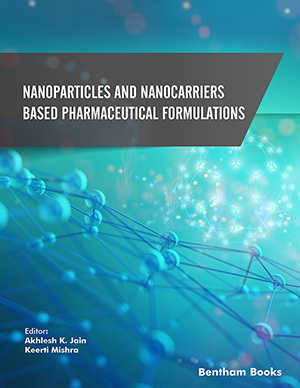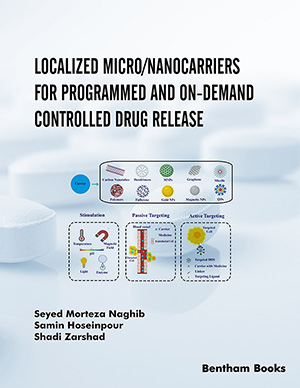
Abstract
Background: Form last few decades, nanoparticles have witnessed breakthroughs in the treatment of neurological disorders due to their unique physiochemical properties, which make them an effective drug delivery system. However, there is not much information available on the toxicity of nanoparticles in neuronal disorders. The toxic effect of nanoparticles on brain disorders and their regulatory issues are the primary concerns of the healthcare industry.
Methods: A strategical literature search was performed on various bibliographic databases such as Scopus, PubMed, SciFinder, Google Scholar, Medline, Google Patent, Derwent Innovation, and Orbit Intelligence for retrieval of peer-reviewed articles and patents on regulatory issues and toxicity of nanoparticles in neuronal disorders for last decade. The relevant hits of articles and patents were analyzed, and citation search for the relevant documents was carried out. Results: The literature documents have been summarized regarding the existing regulatory issues and toxicity of nanoparticles on neuronal disorders with a focus on the detailed mechanism of the developmental toxicity of nanoparticles. The focus of this report is to emphasize the negative effects of nanoparticle on neuronal disorders, which may partially contribute to the management of toxicity of nanoparticles. Conclusion: Although nanoparticles have unique physical and chemical properties that explain the broad range of application for the central nervous system, they can also manifest neurotoxic effects due to cell necrosis, generation of free radicals, immune responses and neuroinflammation. Thus, this review highlights risk assessment, safety regulations and regulatory guidelines of nanoparticles, which may reduce adverse reactions in humans and animals.Keywords: Toxicity, neuronal disorder, brain diseases, nanoparticles, regulatory, patent.
[http://dx.doi.org/10.1016/j.addr.2019.02.007]
[http://dx.doi.org/10.2174/1871527313666141023100618]
[http://dx.doi.org/10.2174/1574889808666131128105141]
[http://dx.doi.org/10.2174/1877912311202010045]
[http://dx.doi.org/10.2174/1567205014666170508121031]
[http://dx.doi.org/10.1166/jnn.2016.13032]
[http://dx.doi.org/10.3390/pharmaceutics11010026]
[http://dx.doi.org/10.2174/1389200216666150812122302]
[http://dx.doi.org/10.1016/j.nbd.2009.07.030]
[http://dx.doi.org/10.1371/journal.pone.0084179]
[http://dx.doi.org/10.1152/ajpheart.2001.280.3.H1241]
[http://dx.doi.org/10.1038/jcbfm.1988.109]
[http://dx.doi.org/10.1016/S0301-0082(02)00128-4]
[http://dx.doi.org/10.1016/j.biopha.2018.12.133]
[http://dx.doi.org/10.1016/j.apsb.2016.05.013]
[http://dx.doi.org/10.2217/nnm.12.86]
[http://dx.doi.org/10.15171/bi.2016.30]
[http://dx.doi.org/10.1002/1520-6017(200011)89:11<1371:AID-JPS1>3.0.CO;2-D]
[http://dx.doi.org/10.1016/j.nano.2011.08.006]
[http://dx.doi.org/10.1073/pnas.94.17.9469]
[http://dx.doi.org/10.1016/j.brainres.2008.01.039]
[http://dx.doi.org/10.1016/j.jconrel.2005.07.024]
[http://dx.doi.org/10.3390/app9112219]
[http://dx.doi.org/10.1007/BF00296515]
[http://dx.doi.org/10.1016/j.drudis.2008.09.005]
[http://dx.doi.org/10.1002/cbic.200700262]
[http://dx.doi.org/10.2147/IJN.S61288]
[http://dx.doi.org/10.5455/ajrms.20180717105137]
[http://dx.doi.org/10.1006/nbdi.2001.0402]
[http://dx.doi.org/10.1080/13813450902949012]
[http://dx.doi.org/10.1016/j.jconrel.2016.05.044]
[http://dx.doi.org/10.1021/mp050032z]
[http://dx.doi.org/10.2147/IJN.S596]
[http://dx.doi.org/10.1111/j.1582-4934.2002.tb00450.x]
[http://dx.doi.org/10.1023/A:1020440229102]
[http://dx.doi.org/10.3389/fphar.2015.00286]
[http://dx.doi.org/10.1016/S0076-6879(09)65007-2]
[http://dx.doi.org/10.1073/pnas.1516524113]
[http://dx.doi.org/10.1080/10717544.2017.1344334]
[http://dx.doi.org/10.1016/j.biomaterials.2012.03.058]
[http://dx.doi.org/10.1016/j.nantod.2015.06.006]
[http://dx.doi.org/10.1517/17425247.2012.673278]
[http://dx.doi.org/10.1517/17425247.2012.717928]
[http://dx.doi.org/10.1016/S0939-6411(00)00087-4]
[http://dx.doi.org/10.3109/10611869609015973]
[http://dx.doi.org/10.1016/j.ejpb.2013.08.013]
[http://dx.doi.org/10.3109/1061186X.2012.716845]
[http://dx.doi.org/10.3109/21691401.2014.909822]
[http://dx.doi.org/10.3109/10837450.2010.542163]
[http://dx.doi.org/10.1016/j.nano.2015.09.004]
[http://dx.doi.org/10.2147/IJN.S57565]
[http://dx.doi.org/10.3390/pharmaceutics6040557]
[http://dx.doi.org/10.2174/1567201816666190123124429]
[http://dx.doi.org/10.18433/jpps30117]
[http://dx.doi.org/10.1016/j.drudis.2016.02.006]
[http://dx.doi.org/10.1038/sj.gt.3301665]
[http://dx.doi.org/10.1007/s11095-006-9132-0]
[http://dx.doi.org/10.1021/acs.jmedchem.5b01031]
[http://dx.doi.org/10.1002/mds.22801]
[http://dx.doi.org/10.1016/j.tox.2007.12.017]
[http://dx.doi.org/10.1021/acs.biomac.6b01547]
[http://dx.doi.org/10.1038/mp.2016.23]
[http://dx.doi.org/10.1002/em.21909]
[http://dx.doi.org/10.1016/j.msec.2017.03.283]
[http://dx.doi.org/10.1016/j.nano.2017.06.022]
[http://dx.doi.org/10.1091/mbc.e17-06-0416]
[http://dx.doi.org/10.1016/j.biomaterials.2017.01.006]
[http://dx.doi.org/10.1016/j.cbi.2016.09.006]
[http://dx.doi.org/10.18632/oncotarget.16723]
[http://dx.doi.org/10.1016/j.msec.2014.01.005]
[http://dx.doi.org/10.1016/j.biomaterials.2014.12.005]
[http://dx.doi.org/10.1371/journal.pone.0057097]
[http://dx.doi.org/10.1039/C3NR04878K]
[http://dx.doi.org/10.1039/C5CC01855B]
[http://dx.doi.org/10.1109/TNB.2009.2017321]
[http://dx.doi.org/10.1016/j.colsurfb.2007.04.019]
[http://dx.doi.org/10.1038/nbt1006-1211]
[http://dx.doi.org/10.1016/j.bbrc.2015.08.023]
[http://dx.doi.org/10.1021/mp200394t]
[http://dx.doi.org/10.1111/nyas.12403]
[http://dx.doi.org/10.1016/j.addr.2009.03.009]
[http://dx.doi.org/10.1016/j.jconrel.2013.05.025]
[http://dx.doi.org/10.2174/1389450115666140804124808]
[http://dx.doi.org/10.1016/j.jconrel.2018.02.013]
[http://dx.doi.org/10.3390/ijms12096267]
[http://dx.doi.org/10.3390/jcm7120490]
[http://dx.doi.org/10.1007/s00441-007-0432-4]
[http://dx.doi.org/10.3390/nano9010096]
[http://dx.doi.org/10.1016/j.taap.2016.02.014]
[http://dx.doi.org/10.3934/molsci.2018.1.1]
[http://dx.doi.org/10.1016/j.xphs.2017.05.026]
[http://dx.doi.org/10.3390/pharmaceutics11030101]
[http://dx.doi.org/10.1371/journal.pone.0134722]
[http://dx.doi.org/10.1371/journal.pone.0048752]
[http://dx.doi.org/10.1186/s12989-018-0263-3]




















